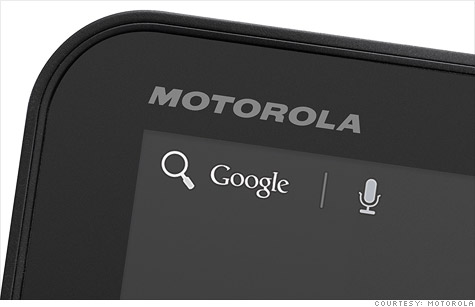

In a surprise deal that would be its largest acquisition ever, Google has agreed to buy Motorola Mobility for $12.5 billion, the two companies said Monday.
Google, the world's search leader, said it believes the mobile device maker will help it gain an even stronger foothold in the mobile marketplace. Google licenses Android, the popular mobile operating system, which competes with Apple's (AAPL, Fortune 500) iPhone and iPad, Research In Motion's (RIMM) BlackBerry and Microsoft's (MSFT, Fortune 500) Windows Phone among others.
But Google also said it wants to buy Motorola Mobility to defend against patent lawsuits levied by its competitors.
Motorola Mobility has been in the communications business for more than 80 years, and it invented the cell phone 30 years ago -- back when it was still just called "Motorola." Earlier this year, Motorola's consumer products business split from its public safety business, Motorola Solutions (MSI, Fortune 500).
Motorola Mobility, the part of the business most consumers are familiar with, held on to the 17,000 patents the company has been issued worldwide. It also has 7,500 patents pending approval.
As Android has grown to become the world's most used smartphone operating system, Google has faced an increasing number of patent lawsuits, most recently from Microsoft and Apple.
"We've been saying for some time that we intend to protect the Android ecosystem," David Drummond, chief counsel for Google, said Monday on a conference call with analysts. "We think that having this kind of patent portfolio to protect the ecosystem is a good thing."
Google recently tried to buy a portfolio of key telecommunications patents from bankrupt Nortel for $1 billion. But the winning bid -- of a whopping $4.5 billion -- was submitted by Google's rivals, including Microsoft and Apple.
Acquiring patents is often used as a defense tactic to stave off lawsuits from competitors. Whether the claims are legitimate or not, rivals often sue one another for patent violations to scare away potential partners or take some of the revenue off the top of their competitors' sales. America's patent system is so complex that such claims can take years -- and cost millions -- to litigate.
Google is paying $40 a share for Motorola Mobility Holdings (MMI), a premium of 63% over the closing price on Friday. The $12.5 billion price tag -- all cash -- is by far the largest that Google ever paid for an acquisition.
The deal is subject to regulatory approval, which Google said it expects to pass. Google has come under heavy scrutiny lately in both the U.S. and Europe from regulators concerned about its growing industry dominence, especially in the search field. The Motorola bid would expand Google into a wholly new market area -- one in which it doesn't currently compete.
Google's (GOOG, Fortune 500) stock fell about 1% in early trading while Motorola's rose 57%.
Motorola has struggled in recent quarters, citing delays in getting some of its key products, like the eagerly anticipated Droid Bionic, onto store shelves. Other promising devices have failed to meet expectations, like the smartphone-that-becomes-a-laptop Atrix 4G.
Last quarter, Motorola lost $56 million and disappointed Wall Street analysts by saying results for its current quarter would be weaker than expected.
Its tablet business has also been far less profitable and successful than it expected. Motorola sold just 440,000 Xoom tablets in the quarter. The Xoom, which was the first of Google's first Android Honeycomb tablet, was expected by many analysts to be the first true test for the iPad. It hasn't been: Apple sold 9.25 million iPads last quarter.
But Google's Page said he is excited about the growth opportunity that the deal presents.
"We believe Motorola Mobility is poised for tremendous growth," he said. "The deal allows us to supercharge the whole Android system. There's tremendous opportunity here."
Information CNN

